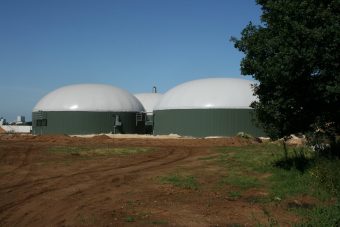
While most people will identify electric vehicles as a sustainable form of transport, particularly when paired with renewable electricity generation, biogas also holds great potential to substantially reduce greenhouse gas emissions from the transport sector.
“In the global pursuit for sustainable transport, biogas represents a great opportunity for countries to address climate change while harnessing local economic benefits in the rural sector and tackling environmental challenges such as waste management,” says Dolf Gielen, Director of IRENA’s Innovation and Technology Centre, about the release of IRENA’s latest addition to its sustainable transport series, Biogas for Road Vehicles.
IRENA’s newest technology brief highlights the process and technology status of biogas and provides insight to policy makers that want to include it in their plans for sustainable transport.
So what is biogas? In short, biogas is a combination of methane, carbon dioxide and some minor impurities, derived from biomass. Biomass, like wastewater, manure, industrial and municipal waste, or crops, can through microbiological processes be broken down and transformed into biogas.
“The production of biogas is a natural process, but with modern technology we can purify or upgrade biogas to natural gas quality,” explains Francisco Boshell, an analyst at IRENA’s Innovation and Technology Centre. “Upgraded biogas is versatile and can be used in the same applications as natural gas, including to power natural gas vehicles. For decades, some countries have seen the potential of this technology and ordinary cars already exist that are powered with biogas.”
Biogas as vehicle fuel is starting to be more commonly used on the roads, and the largest producers of biogas as vehicle fuel in 2016 were Germany, Sweden, Switzerland, the UK and the US. Globally there’s an estimated 500 plants that produce biogas and upgrade it to natural gas. Their combined output is about 50 petajoule per year, which is an equivalent energy amount to around 1.3 billion litres of diesel. While the global liquid fuel consumption was higher than 3,000 billion litres as of 2014, 1.3 billion is a drop in the ocean — a drop that has a significant advantage over fossil fuels, as biogas produces substantially less greenhouse gas emissions.
Making reductions in cost
Typically the price of producing biogas ranges between USD 0.22 and USD 0.39 per cubic meter of methane for manure-based biogas production, and USD 0.11 to USD 0.50 per cubic meter of methane for industrial waste-based biogas production.
IRENA anticipates that cost reductions in the range of 30 to 40 per cent appear to be realistic. The technology for biogas production and further purification and upgrading, is reliable and mature, and converting biomass to energy by anaerobic digestion can be done with a variety of feedstocks — enabling more price competitive options for producers.
Upgrading a biogas increases its flexibility, meaning it can be used either as vehicle fuel or to produce heat or electricity. The potential multiple uses of upgraded biogas, offers biogas production plants diversity in their product portfolio and helps ensure a sustainable business.
To learn more about sustainable solutions in the transport sector, IRENA is developing a transportation series that includes Biofuels for Aviation, Electric Vehicles, and Renewable Energy Options for Shipping.
Source: irenanewsroom.org


